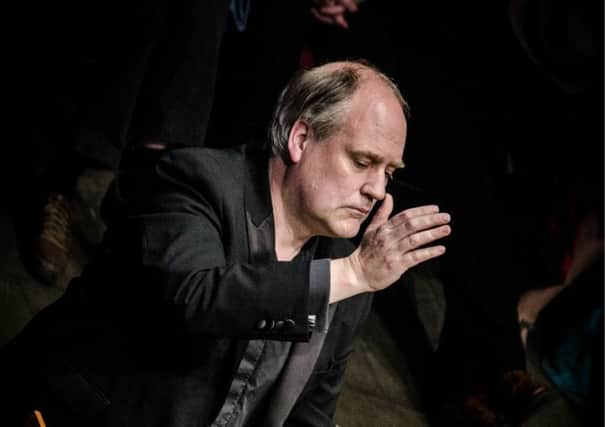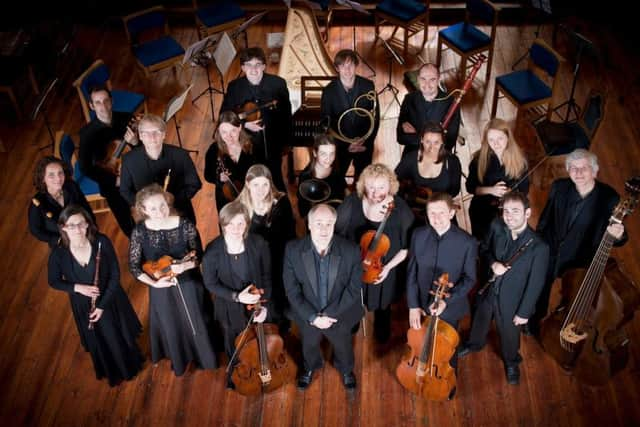John Butt makes Handel’s Messiah for the children


How do you make Handel’s Messiah work for children? I can’t say it’s the most obvious of musical works to turn into a fun family day out. Three hours of Handelian recitative, aria and chorus sounds about as much fun for a 10-year old as being told they have to spend an enforced Sunday afternoon with elderly relatives.
But enter John Butt: on the outside giving the impression of a slightly absent-minded professor; but harbouring beneath that amiable facade a sharp, dynamic and brilliantly excitable musical mind that anyone following the escalating fortunes of his award-winning Dunedin Consort will immediately appreciate.
Advertisement
Hide AdSo what is this Children’s Messiah which the Dunedin is presenting on Sunday 20 December in the Queen’s Hall, Edinburgh, and for which there is “no age restriction” and guaranteed “fun for all the family”? Will Butt – himself a father of five – be encouraging audience participation? Hip Hop to the Hallelujah Chorus? Baby volunteers for the nativity section? A chorus of kazoos trumpeting along to The Trumpet Shall Sound?


It’s more straightforward than that. “We choose a framework of pieces that is relatively short and to the point and build some talk and demonstration around it,” Butt explains. It amounts to a 45-minute afternoon programme aimed at “any age group from babies up to mid teens”. It is, he reckons, once you factor in the parents, one for the whole family.
Dunedin’s regular singers are there to help out, including the charismatic baritone Matthew Brook and the ever-smiling Scots soprano Mhairi Lawson. “Mhairi is fantastic with the children,” says Butt. “She knows instinctively the manner and language needed to convey difficult musical points to young minds.”
Furthermore, it’s been tried and tested. “I did it last year in Portland, Oregon, and also a version in Edinburgh, both of which were quite successful,” says Butt. “We might even get the audience singing this year.”
It might seem a little strange to hear one of the world’s foremost Baroque experts – we’re talking major book publications on Bach and worldwide recognition as a teacher and interpreter here – talking about “babies dancing” to one of the Classical music repertoire’s most sacred cows. Butt believes it was a work Handel intended to be used freely, widely and flexibly.
Those old enough to recall the fad of Messiahs For All that swept UK town and village halls in the 1970s and 80s will appreciate its musical resilience. In these, the audiences became a spontaneous chorus, numbering anything from a few dozen to thousands-strong full houses at the Royal Albert Hall. Handel’s music survived, even if this brief gimmick wore itself out.
Advertisement
Hide Ad“It was written in such a way that it can take lots of punishment,” Butt argues, referring to it as a “Portmanteau Oratorio”, written with no definite purpose other than to be performed wherever, whenever and however the fancy takes you, and pointing to an abstract quality that is quite unique in relation to other Handel oratorios.
“You can tell from the varied scale of early performances that Handel designed it very specifically as a pop-up touring piece,” Butt adds. Sure enough, how different must the original small scale performances in Dublin and London have sounded to the later vogue for huge-scaled versions that sprang up in the 1780s in the likes of Westminster Abbey, where a 250-strong orchestra was reportedly used?
Advertisement
Hide AdNowadays, the preference –particularly in such award-winning Messiah recordings as the Dunedin’s – is to emulate Handel’s original practice, and that’s exactly what audiences can enjoy in Edinburgh the same evening as next weekend’s children’s version, and also the following night in Glasgow’s Kelvingrove Art Gallery and Museum. In these, the soloists democratically emerge from within the small, tight-knit chorus, accompanied by the Consort’s excellent period instrument players.
But a few days before that, Butt and the the Dunedin are in Seville to perform Messiah on a completely different scale. “It’s a very large production which we’re doing in collaboration with the Seville Symphony Orchestra,” he explains. “I’ll arrive and train the amateur chorus, who will then get together with our singers who’ll do the fast and difficult pieces.”
Last week, he conducted the Scottish Chamber Orchestra in a programme themed on generations of the Bach family. Back in August, he came to the last-minute rescue of a Rameau/Charpentier operatic programme at the Edinburgh International Festival which William Christie had pulled out of. It was never an ideal scenario to step into, the original programme was inordinately long and ungainly, and the rehearsal times scheduled with a big gap before the performance to suit Christie, yet Butt made it happen against the odds.
“Several depth charges were left over,” he recalls. “I think the whole shape of the programme was impractical. It would never have worked in any circumstances. But in the end I enjoyed it.”
Butt’s performance diary is expanding by the day. He’s now a featured artist with the Orchestra of the Age of Enlightenment, alongside Sir Simon Rattle, Sir Mark Elder, Iván Fischer and Vladimir Jurowski. And he’s set to inaugurate a new Mozart Piano Concertos series with the Aurora Orchestra in London, directing and performing the Piano Concerto No 1 on harpsichord.
“Somehow I have to fit in my university teaching,” says the indefatigable Butt. He’s simply a bundle of unstoppable energy, with a mind that runs twice the speed of anyone else. Even kids will have fun keeping up with him.
Advertisement
Hide Ad• The Dunedin Consort presents Handel’s Children’s Messiah at the Queen’s Hall, Edinburgh, 20 December. There are full performances the same evening at the Queen’s Hall, and at Kelvingrove Art Gallery, Glasgow, 21 December, www.dunedin-consort.org.uk